翻译
翻译的定义

翻译的定义
翻译是将一种语言或文字转换为另一种语言或文字的过程。
它是人类交流的重要方式之一,使不同语言和文化之间的交流成为可能。
翻译的目的是传达原始信息并保持原始信息的准确性和意义。
翻译涉及对语言和文化的深入理解,需要对语言的语法、词汇、语义和文化背景有广泛的知识。
翻译可以分为口译和笔译两种形式。
口译是在口头交流
中进行的翻译,译员实时将发言者的语言转换为听众的语言。
笔译是在书面文本中进行的翻译,译员通过阅读原始文本并将其转化为目标语言的书面形式。
翻译的过程包括以下几个步骤:首先,译员需要仔细阅
读并理解原始文本的意义和上下文。
然后,译员将使用目标语言的语法、词汇和文化知识将原始文本转换为目标语言的文本。
在进行翻译时,译员需要注意保持原始信息的准确性和完整性,同时遵循目标语言的语法规则和习惯用法。
最后,译员需要对翻译的文本进行校对和编辑,以确保翻译的质量和准确性。
翻译在各个领域都发挥着重要作用,包括商务、外交、
文化交流、学术研究等。
翻译也促进了全球化的进程,使不同国家和文化之间的交流更加紧密和便利。
然而,翻译也面临一些挑战,如语言的多义性、文化差异、专业术语的难以处理等。
因此,翻译需要高度的专业能力和敏感性,以保证翻译的质量和准确性。
总之,翻译是将一种语言或文字转换为另一种语言或文
字的过程,是促进不同语言和文化之间交流的重要工具。
它需
要对语言和文化的深入理解,并在保持准确性和意义的同时,根据目标语言的规则进行转换。
翻译在各个领域都发挥着重要作用,推动了全球化的发展。
什么是翻译

什么是翻译翻译,是一种跨语言、跨文化的交流方式,通过将源语言文本转化为目标语言文本,传达相似或相同的意义和信息。
作为一门语言学和交际学的学科,翻译在人类社会中扮演着重要的角色。
翻译有着悠久的历史,早在文明诞生之初,人们就已经开始进行语言的转换和沟通。
翻译既有口头翻译,也有书面翻译,不仅在政治、经济、文化等领域发挥作用,还在科学、技术和学术交流中发挥着重要的作用。
翻译可以分为笔译和口译两种形式。
笔译是指将一种语言的书面文本转化为另一种语言的书面文本,包括文学作品、商务文件、官方文件等。
口译是指通过口头表达的方式进行翻译,包括会议翻译、陪同翻译、同声传译等。
无论是笔译还是口译,翻译者需要具备出色的语言能力、跨文化理解能力和表达能力,以确保翻译的准确性和流畅性。
在进行翻译时,翻译者需要面对许多挑战。
首先,语言之间存在差异,包括语法、语言习惯、词汇等方面,需要翻译者进行准确的理解和转化。
其次,文化之间存在差异,不同文化背景下的语言有着不同的表达方式和语义。
翻译者需要了解这些文化差异,并将其融入到翻译过程中。
此外,翻译者还需要具备良好的搜索和研究能力,以确保所提供的译文准确无误。
翻译不仅仅是语言的转换,更是一种文化的传递。
通过翻译,不同国家和地区的人们可以相互了解、交流、合作,并推动全球化的进程。
翻译不仅有助于促进文学、艺术、科学、技术等领域的交流与发展,同时也有助于缩小各种差距,促进世界和平与发展。
总之,翻译作为一门重要的语言学和交际学学科,不仅在日常生活中发挥着重要作用,也在全球化的背景下具有重要意义。
通过翻译,人们可以跨越语言和文化的障碍,实现跨国交流与合作,共同推动人类社会的发展。
翻译的类型

翻译的类型
翻译的类型可以分为以下几种:
1. 文字翻译:将一种语言的书面文字转译为另一种语言的文字,包括文学作品、商业文件、科技论文等。
2. 口译翻译:将一种语言的口头言语转译为另一种语言的口头言语,在会议、活动、演讲等场合中进行。
3. 机器翻译:利用计算机程序进行翻译,通过自动翻译系统实现将一种语言的文字或口译转化为另一种语言。
4. 本地化翻译:将产品、服务或软件等进行适应目标市场的语言、文化和法规等方面的调整,以满足特定受众的需求。
5. 笔译翻译:通过文字工具将一种语言的文字转译为另一种语言的文字,常见于文学作品、正式文件、学术论文等。
6. 口译翻译:将一种语言的口头言语转译为另一种语言的口头言语,常见于会议、活动、演讲等场合。
7. 同声传译:实时将演讲者的口语内容转译为另一种语言,通过设备供听众即时听到对应的翻译。
8. 口译陪同翻译:通常用于陪同外国客户逛街购物、旅游观光等活动,为客户提供语言沟通服务。
100个英语翻译
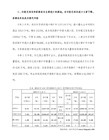
70.重视 attach great importance to…
71.社会地位 social status
72.把时间和精力放在…上 focus time and energy on…
73.扩大知识面 expand one’s scope of knowledge
74.身心两方面 both physically and mentally
78.缓解压力/ 减轻负担 relieve stress/ burden
79.优先考虑/发展… give (top) priority to sth.
80.与…比较 compared with…/ in comparison with
81. 相反 in contrast / on the contrary.
14.就…达到绝对的一致 reach an absolute consensus on…
15.有充分的理由支持 be supported by sound reasons
16.双方的论点 arguments on both sides
17.发挥着日益重要的作用 play an increasingly important role in…
54.在一定程度上 to some extent/ degree / in some way
55. 理论和实践相结合 integrate theory with practice
56. …必然趋势 an irresistible trend of…
57.日益激烈的社会竞争 the increasingly fierce social competition
34.为社会做贡献 make contributions to the society
什么是翻译

什么是翻译
翻译,是指在不改变语言意思的基础上,把一种语言信息转变成另一种语言信息的过程。
简而言之,不同语言之间的转换语言即是翻译。
翻译是用译语传达原语的意思,具有传译性,翻译是传递信息的活动,翻译是一门学科,科学性,艺术性。
1、翻译的目的
广义:翻译的目的是使异语读者能获得与原语读者一样的信息和感受。
翻译涉及到语言学,社会学,音韵学,音乐学,美学,心理学,逻辑学。
2、翻译有哪几种可行的方法
四种方法,直译、意译、音译、半音译
3、普通翻译完美标准、三要素
严复:信、达、雅
周氏兄弟:通顺流畅三美:意美、形美、音美(意美以感心,形美以感目,音美以感耳)
现代翻译理论三要素:传意性,相似性,可接受性
4、科技翻译完美标准
准确性,简明性,科学性(专业性)
5、翻译的技巧
分译法,合译法,省略,减字,增字添词,词性转换,语态转换,变通,表层结构,深层结构。
翻译的最高原则是要发挥译者的主观能动性,运用最好的译语表达方式,而又不违背原文的内容。
西方的对等论只要求“不逾矩”:是低标准;中国译论要求“从心所欲”,是高标准。
希望有所帮助。
经典翻译100条

1.有志者,事竟成.Nothing is impossible to a willing heart./Where there is a there is a way.2.千里之行,始于足下.The longest journey begins with the first step.3.积少成多.Every little helps.4.满招损,谦受益.Pride hurts,modesty benefits.5.世上唯有贫穷可以不劳而获.Nothing is to be got without pain but povert6.伟业非一日之功/冰冻三尺非一日之寒.Rome was not bult in a day.7.一寸光阴一寸金,寸今难买寸光阴.Lost years are worse than lost dollars.8.自助者天助.God helps those who help themselves.9.欲速则不达.More haste,less speed.10.台上一分钟,台下十年功.One minute on the stage needs ten years practice stage.11.好的开端是成功的一半.Well begun is half done.12.酒好不怕巷子深.Good wine needs no bush.13.成功源于勤奋.Industry is the parent of success.14.英雄所见略同.Great minds think alike.15.熟能生巧.Practice makes perfect.16.静水流深.Still waters run deep.17.滴水穿石.Little stone fell great oaks.18.前事不忘,后事之师.The membrance of the past is the teacher of the fut19.君子之交淡如水.A hedge between keeps friendship green.20.机不可失,时不再来.Take time while time is,for time will away.21.集思广益.Two heads are better than one.22.未雨绸缪.Provide for a rainy day.23.真金不怕火炼.True blue will never strain.24.必须相信自己,这是成功的秘诀.You have to believe in yourself.That's secret of success.25.燕雀安知鸿鹄之志.A sparrow cannot understand the ambition of a swan.26.身正不怕影子歪.A straight foot is not afraid of a crooked shoe.27.天涯何处无芳草.There is plenty of fish in the sea.28.大智若愚.Cats hind their paws.29.人不可貌相,海水不可斗量.Judge not a book by its cover.(Never judge appearances.)30.有情人终成眷属.All shall be well,Jack shall have jill.31.海内存知己,天涯若比邻.The world is but a little place,after all.32.宁为鸡头,不为凤尾.It is better to be a head of dog than a tail of a l33.良药苦口.A good medicine tastes bitter.34.知识就是力量.Knowledge is power.35.金钱不是万能的.Money is not everything.36.时不我待.Time and tide wait no man.37.少壮不努力,老大徒伤悲.A young idler,an old beggar.38.趁热打铁.Strike while the iron is hot.39.天生我才必有用.Every man has his price.40.看破生死的人能成大事.He who sees through life and death will meet with success.41.世上无难事,只要肯登攀.Nothing is impossible to a willing heart.42不入虎穴,焉得虎子.Noting venture,noting gain.43.不鸣则已,一鸣惊人.It never rains but it pours.44.胜者为王,败者为寇.Losers are always in the wrong.45.谋事在人,成事在天.Man proposes,God deposes.46.众人拾柴火焰高.Many hands make light work.47.不经风雨,怎能见彩虹. No cross, no crown.48.没有付出,就没有收获.No pain, no gain.49.不进则退.Not to advance is to go back.50.No way is impossible to courage.勇者无惧.51. 闪光的不一定是黄金.All is not gold that glitters./All that glitters is gold.52.The strong pass of the enemy is like a wall of iron,yet with firm str we are conquring its summit.雄关漫道真如铁,而今迈步从头越.53.My journey is long and winding, I will keep on exploring my way far and w 路漫漫其修远兮,我将上下而求索.54.一分价钱一分货.You get what you pay off.55.眼见为实.Seeing is believing.56.无风不起浪.Where there's smoke without fire.57.哪里有压迫,哪里就有反抗.Where there's oppression there's resistance.58. 祸兮福所依,福兮祸所伏.All the Evils to be considered with the Good, is in them, and with that worse attends them.59.Make your whole year's plan in the spring and the whole day's plan in morning.一年之计在于春,一天之计在于晨.60.细节决定成败.Details is the key to success.61.A man loves his sweetheart the most,his wife the best,but his mother longest.男人对他的情人最爱,对他的妻子最好,而对他母亲的爱最长久.62.A big tree falls not at the first stroke.一斧子砍不倒大树.63.Early to bed, early to rise makes a man healthy,wealthy and wise.早睡身体好.64.Ask not what your country can do for you;Ask what you can do for your coun 不要问你的国家能为你做什么,而要问你能为你的国家做什么.65.Repent,for the kingdom of heaven is near.忏悔吧,因为天国已经不远了.66.Rejoicing in hope, patienting in trabulation.从希望中得到快乐,在磨难持坚韧.67.Never put off until tomorrow what may be done today.今日事今日毕.68.Something attempted,something done.没有尝试,就没有成功.69.Hope for the best,prepare for the worst.好处着想,坏处准备.70.Great hope makes great man. 伟大的思想造就伟大的人.71.A rolling stone gathers no moss.滚石不聚苔,转行不聚财.72.When in Rome, do as the Romans do.入乡随俗.73.Knowledge is a measure, but practise is the key to it.知识是珍宝,而实获取它的钥匙.74.Lost time is never found again.光阴一去不复返.75.Difficulties strengthen the mind, as labour does the body.劳动强体,磨智.76.Behind bad luck comes good luck.塞翁失马,焉知非福.77.All for one, one for all.我为人人,人人为我.78.Treat other people as you hope they will treat you.己所不欲,勿施于人79.Suspicion is the poison of friendship.怀疑是对友谊所下的毒药.80.He laughs best who laughs last.谁笑到最后,谁笑得最美.81.Follow your own course, and let people talk.走自己的路,让别人说去吧82.Initiative is doing the right thing without being told.主动性就是在没告诉时做正确的事情.83.Think twice before acting.三思而后行.84.Adversity reveals genius, fortune conceals it.苦难显才华,好运藏天知.85.The water that bears the boat is the same that swallows it up.水能载亦能覆舟.86.Better be the head of a dog than the tail of a lion.宁为鸡头,不为凤尾87.A stitch in time saves nine.防微杜渐.88.Diamond cuts diamond.强中更有强中手.89.The early bird catches the worm.捷足先登.90.Whatever you go, go with all your heart.无论做什么事,一定要全力以赴.91.The good seaman is known in bad weather.惊涛骇浪,方显英雄本色.92.Where there is life, there is hope.留得青山在,不怕没柴少.93.All thing are difficult before they are easy.万事开头难.94.Life is not all roses.人生并不都是康庄大道.95.Heaven never seals off all the exits.天无绝人之路.96.Is it not a joy to have friends come from afar?97.Reading is always profitable.开卷有益.98.A gentleman acts on behalf of an understanding friend,as a woman makes her beautiful for her lover.士为知己者用,女为说悦己者容.99.Actions speak louder that words.事实胜于雄辩.100.Mastery of work comes from diligent application, and success depond forethought.业精于勤,行成于思.1. A bosom friend afar brings a distant land near. 海内存知己,天涯若比邻。
翻译有哪些类型

翻译有哪些类型
翻译可以分为多种类型,下面列举了几种常见的翻译类型:
1. 文学翻译:文学翻译是将一篇文学作品从一种语言翻译成另一种语言。
该类型的翻译要求译者不仅要精准地传达原作的意思,还要通过语言的艺术性表达出原作的风格和情感。
2. 技术翻译:技术翻译是将科技类、工程类或专业类文章、文件或手册等从一种语言翻译成另一种语言。
该类型的翻译需要译者具备丰富的专业知识和术语的理解能力,确保在翻译过程中不丢失原文的精确度和准确性。
3. 口译翻译:口译翻译是通过听懂一种语言并即时将其翻译成另一种语言。
这种类型的翻译常用于会议、旅游、商务谈判和演讲等场合,要求译者快速准确地传递原意,并能在瞬息万变的环境中灵活应对。
4. 笔译翻译:笔译翻译是将书面材料从一种语言翻译成另一种语言,主要包括文件、报告、新闻文章、小说等。
这种类型的翻译需要译者具备翻译技巧和良好的语言表达能力,以忠实于原文但又符合目标语言习惯和文化背景。
5. 法律翻译:法律翻译是将与法律相关的文件、合同、法规等从一种语言翻译成另一种语言。
这种类型的翻译要求译者熟悉法律术语和法律体系,并能准确传达原文的法律意义,避免可能的法律风险和误解。
6. 商务翻译:商务翻译是将商务文件、会议记录、商务信函等从一种语言翻译成另一种语言。
这种类型的翻译需要译者对商务礼仪和商业领域的文化背景有深入的了解,以确保在商务交流中准确传达信息和避免误解。
总之,不同的翻译类型对译者的要求和技巧有所不同。
无论是哪种类型的翻译,译者都需要具备良好的语言能力、专业知识和文化理解能力,并且能够根据具体情境和要求进行合适的翻译处理。
翻译有几种
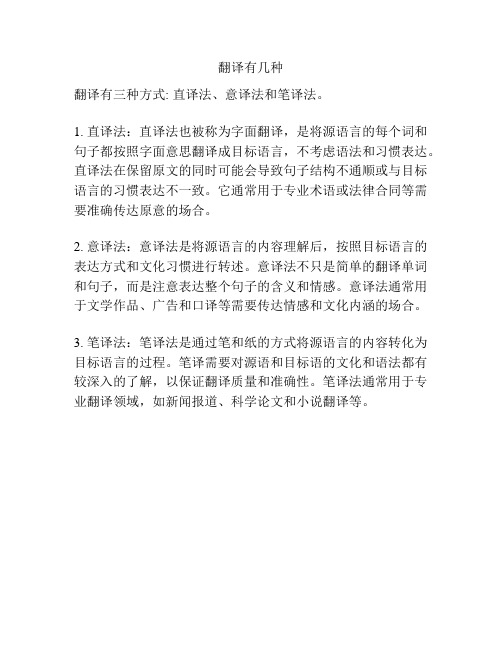
翻译有几种
翻译有三种方式: 直译法、意译法和笔译法。
1. 直译法:直译法也被称为字面翻译,是将源语言的每个词和句子都按照字面意思翻译成目标语言,不考虑语法和习惯表达。
直译法在保留原文的同时可能会导致句子结构不通顺或与目标语言的习惯表达不一致。
它通常用于专业术语或法律合同等需要准确传达原意的场合。
2. 意译法:意译法是将源语言的内容理解后,按照目标语言的表达方式和文化习惯进行转述。
意译法不只是简单的翻译单词和句子,而是注意表达整个句子的含义和情感。
意译法通常用于文学作品、广告和口译等需要传达情感和文化内涵的场合。
3. 笔译法:笔译法是通过笔和纸的方式将源语言的内容转化为目标语言的过程。
笔译需要对源语和目标语的文化和语法都有较深入的了解,以保证翻译质量和准确性。
笔译法通常用于专业翻译领域,如新闻报道、科学论文和小说翻译等。
译文翻译大全
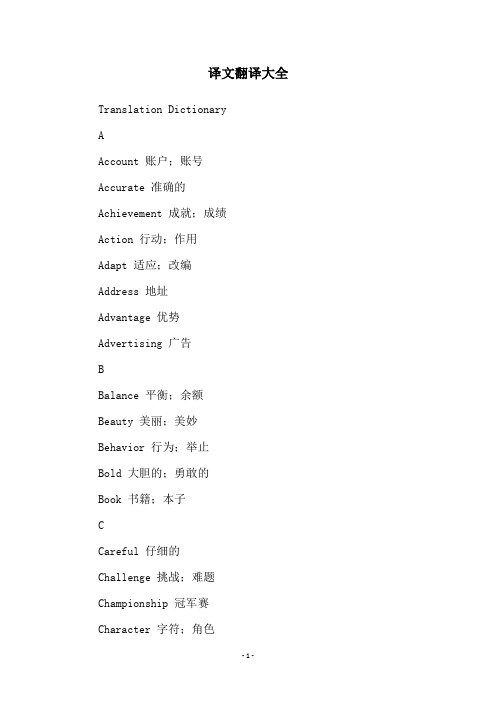
译文翻译大全 Translation DictionaryAAccount 账户;账号Accurate 准确的Achievement 成就;成绩Action 行动;作用Adapt 适应;改编Address 地址Advantage 优势Advertising 广告BBalance 平衡;余额Beauty 美丽;美妙Behavior 行为;举止Bold 大胆的;勇敢的Book 书籍;本子CCareful 仔细的Challenge 挑战;难题Championship 冠军赛Character 字符;角色Church 教堂DData 数据;资料Debt 债务Decision 决定;抉择Description 描述;描写 Design 设计;布置EEducation 教育Electricity 电Employment 雇佣;就业 Energy 能量;力量Engineer 工程师FFamiliar 熟悉的Fashion 时尚;潮流Finance 金融;财政Forgive 宽恕;饶恕Freedom 自由;自主GGift 礼物Goal 目标;目的Golf 高尔夫Government 政府;行政 HHabit 习惯;习性Hall 大厅;厅堂Harmful 有害的Healthy 健康的History 历史IIdentity 身份;本质 Income 收入;收益Interest 兴趣;利息 Interview 面试;会谈 Involve 包含;牵扯JJob 工作;职务Judge 审判;裁定KKitchen 厨房;厨具Knowledge 知识;学问 LLanguage 语言Liberty 自由;豁达Lifestyle 生活方式Logic 逻辑;推理MMajor 专业;主要Mark 标志;印记Material 物质;材料Mile 英里;里程NNature 自然;本质Negative 负面的;消极的 Notice 通告;注意OObject 物体;目标Opinion 意见;看法Organization 组织;机构 PPayment 付款;费用Performance 表演;表现 Pollution 污染;环境污染 Position 位置;姿势QQuantity 数量;量Question 问题;疑问RRace 种族;人种Religion 宗教;信仰Response 回应;答复Reward 奖励;报酬SService 服务;业务Skill 技能;技巧Social 社会的;社交的 Solution 解决方案;溶液 TTeacher 老师;教师Technique 技术;方法Team 团队;组织Technology 技术;科技 Thought 思想;想法UUnit 单位;部门University 大学VValuable 有价值的Victory 胜利;成功 Vision 视觉;远见WWorth 价值;可取之处 XX-ray X光YYard 码;院子Year 年;一年ZZone 区域;地带。
翻译的概念五种
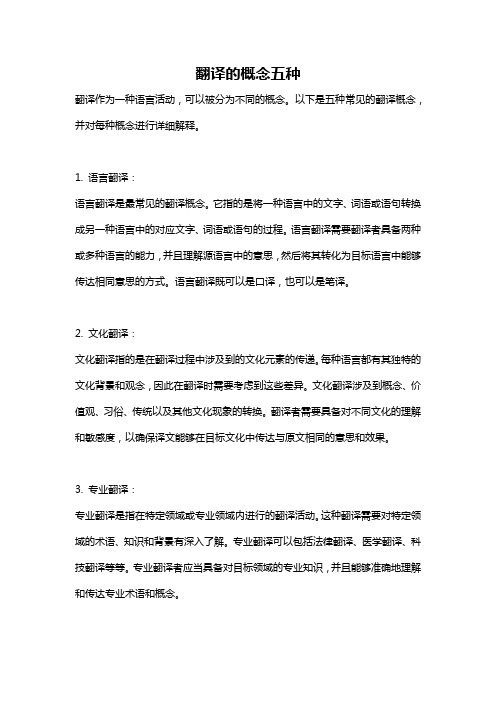
翻译的概念五种翻译作为一种语言活动,可以被分为不同的概念。
以下是五种常见的翻译概念,并对每种概念进行详细解释。
1. 语言翻译:语言翻译是最常见的翻译概念。
它指的是将一种语言中的文字、词语或语句转换成另一种语言中的对应文字、词语或语句的过程。
语言翻译需要翻译者具备两种或多种语言的能力,并且理解源语言中的意思,然后将其转化为目标语言中能够传达相同意思的方式。
语言翻译既可以是口译,也可以是笔译。
2. 文化翻译:文化翻译指的是在翻译过程中涉及到的文化元素的传递。
每种语言都有其独特的文化背景和观念,因此在翻译时需要考虑到这些差异。
文化翻译涉及到概念、价值观、习俗、传统以及其他文化现象的转换。
翻译者需要具备对不同文化的理解和敏感度,以确保译文能够在目标文化中传达与原文相同的意思和效果。
3. 专业翻译:专业翻译是指在特定领域或专业领域内进行的翻译活动。
这种翻译需要对特定领域的术语、知识和背景有深入了解。
专业翻译可以包括法律翻译、医学翻译、科技翻译等等。
专业翻译者应当具备对目标领域的专业知识,并且能够准确地理解和传达专业术语和概念。
4. 机器翻译:机器翻译是指使用计算机和自动化技术进行翻译的过程。
机器翻译使用机器学习、自然语言处理和统计模型等技术,通过在大量语料库中学习和分析语言规律,实现文字、词语或语句的自动翻译。
机器翻译的发展正在不断提升质量和效率,但由于语言的复杂性和文化差异,目前机器翻译仍然无法完全替代人工翻译。
5. 口译翻译:口译翻译是一种将口头语言转换为另一种口头语言的翻译形式。
口译翻译通常在现场进行,例如会议、谈判、演讲等场合。
口译翻译需要翻译者有较强的听觉和口头表达能力,能够在短时间内迅速理解和转达讲话内容。
口译翻译的能力对于语言表达流利度、准确度和语言风格匹配度有很高的要求。
总结起来,翻译概念包括语言翻译、文化翻译、专业翻译、机器翻译和口译翻译。
每种翻译概念都有其独特的特点和要求,翻译者需要具备相应的语言能力、文化理解、专业知识和技能才能进行有效的翻译工作。
123个中文常用短语的英语翻译
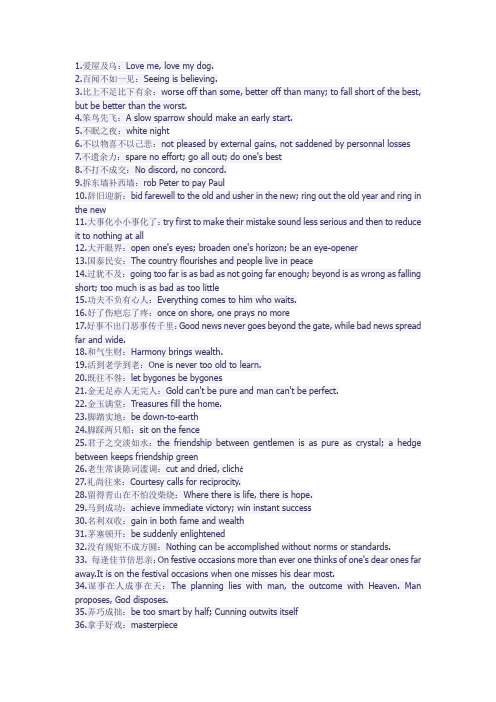
1.爱屋及乌:Love me, love my dog.2.百闻不如一见:Seeing is believing.3.比上不足比下有余:worse off than some, better off than many; to fall short of the best, but be better than the worst.4.笨鸟先飞:A slow sparrow should make an early start.5.不眠之夜:white night6.不以物喜不以己悲:not pleased by external gains, not saddened by personnal losses7.不遗余力:spare no effort; go all out; do one's best8.不打不成交:No discord, no concord.9.拆东墙补西墙:rob Peter to pay Paul10.辞旧迎新:bid farewell to the old and usher in the new; ring out the old year and ring in the new11.大事化小小事化了:try first to make their mistake sound less serious and then to reduce it to nothing at all12.大开眼界:open one's eyes; broaden one's horizon; be an eye-opener13.国泰民安:The country flourishes and people live in peace14.过犹不及:going too far is as bad as not going far enough; beyond is as wrong as falling short; too much is as bad as too little15.功夫不负有心人:Everything comes to him who waits.16.好了伤疤忘了疼:once on shore, one prays no more17.好事不出门恶事传千里:Good news never goes beyond the gate, while bad news spread far and wide.18.和气生财:Harmony brings wealth.19.活到老学到老:One is never too old to learn.20.既往不咎:let bygones be bygones21.金无足赤人无完人:Gold can't be pure and man can't be perfect.22.金玉满堂:Treasures fill the home.23.脚踏实地:be down-to-earth24.脚踩两只船:sit on the fence25.君子之交淡如水:the friendship between gentlemen is as pure as crystal; a hedge between keeps friendship green26.老生常谈陈词滥调:cut and dried, cliché27.礼尚往来:Courtesy calls for reciprocity.28.留得青山在不怕没柴烧:Where there is life, there is hope.29.马到成功:achieve immediate victory; win instant success30.名利双收:gain in both fame and wealth31.茅塞顿开:be suddenly enlightened32.没有规矩不成方圆:Nothing can be accomplished without norms or standards.33. 每逢佳节倍思亲:On festive occasions more than ever one thinks of one's dear ones far away.It is on the festival occasions when one misses his dear most.34.谋事在人成事在天:The planning lies with man, the outcome with Heaven. Man proposes, God disposes.35.弄巧成拙:be too smart by half; Cunning outwits itself36.拿手好戏:masterpiece37.赔了夫人又折兵:throw good money after bad38.抛砖引玉:a modest spur to induce others to come forward with valuable contributions; throw a sprat to catch a whale39.破釜沉舟:cut off all means of retreat;burn one‘s own way of retreat and be determined to fight to the end40.抢得先机:take the preemptive opportunities41.巧妇难为无米之炊:If you have no hand you can't make a fist. One can't make bricks without straw.42.千里之行始于足下:a thousand-li journey begins with the first step--the highest eminence is to be gained step by step43.前事不忘后事之师:Past experience, if not forgotten, is a guide for the future.44.前人栽树后人乘凉:One generation plants the trees in whose shade another generation rests.One sows and another reaps.45.前怕狼后怕虎:fear the wolf in front and the tiger behind hesitate in doing something46. 强龙难压地头蛇:Even a dragon (from the outside) finds it hard to control a snake in its old haunt - Powerful outsiders can hardly afford to neglect local bullies.47.强强联手:win-win co-operation48.瑞雪兆丰年:A timely snow promises a good harvest.49.人之初性本善:Man's nature at birth is good.50.人逢喜事精神爽:Joy puts heart into a man.51.人海战术:huge-crowd strategy52.世上无难事只要肯攀登:Where there is a will, there is a way.53.世外桃源:a fictitious land of peace away from the turmoil of the world;54.死而后已:until my heart stops beating55.岁岁平安:Peace all year round.56.上有天堂下有苏杭:Just as there is paradise in heaven, ther are Suzhou and Hangzhou on earth57.塞翁失马焉知非福:Misfortune may be an actual blessing.58.三十而立:A man should be independent at the age of thirty.At thirty, a man should be able to think for himself.59.升级换代:updating and upgrading (of products)60.四十不惑:Life begins at forty.61.谁言寸草心报得三春晖:Such kindness of warm sun, can't be repaid by grass.62.水涨船高:When the river rises, the boat floats high.63.时不我待:Time and tide wait for no man.64.杀鸡用牛刀:break a butterfly on the wheel65.实事求是:seek truth from facts; be practical and realistic; be true to facts66.说曹操,曹操到:Talk of the devil and he comes.67.实话实说:speak the plain truth; call a spade a spade; tell it as it is68.实践是检验真理的唯一标准:Practice is the sole criterion for testing truth.69.山不在高,有仙则名:No matter how high the mountain is, its name will spread far and wide if there is a fairy.70.韬光养晦:hide one's capacities and bide one's time71.糖衣炮弹:sugar-coated bullets72.天有不测风云:Anything unexpected may happen. a bolt from the blue73.团结就是力量:Unity is strength.74.跳进黄河洗不清:eve if one jumped into the Yellow River, one can not wash oneself clean--there's nothing one can do to clear one's name.75.歪风邪气:unhealthy practices and evil phenomena76.物以类聚,人以群分:Birds of a feather flock together.77.往事如风:The past has vanished (from memory) like wind.78.望子成龙:hold high hopes for one's child79.屋漏又逢连阴雨:Misfortunes never come singly. When it rains it pours.80.文韬武略:military expertise; military strategy81.唯利是图:draw water to one's mill82.无源之水,无本之木:water without a source, and a tree wiithout roots83.无中生有:make create something out of nothing84.无风不起浪:There are no waves without wind. There's no smoke without fire.85.徇私枉法::bend the law for the benefit of relatives or friends86.新官上任三把火a new broom sweeps clean87.虚心使人进步,骄傲使人落后:Modesty helps one go forward, whereas conceit makes one lag behind.88. 蓄势而发:accumulate strength for a take-off89.心想事成:May all your wish come true90.心照不宣:have a tacit understanding; give tacit consent; tacit understanding91.先入为主:First impressions are firmly entrenched.92.先下手为强:catch the ball before the bound93.像热锅上的蚂蚁:like an ant on a hot pan94.现身说法:warn people by taking oneself as an example95.息事宁人:pour oil on troubled waters96.喜忧参半:mingled hope and fear97.循序渐进:step by step98.一路平安,一路顺风:speed somebody on their way; speed the parting guest99.严以律己,宽以待人:be strict with oneself and lenient towards others100.鱼米之乡:a land of milk and honey101.有情人终成眷属:Jack shall have Jill, all shall be well.102.有钱能使鬼推磨:Money makes the mare go. Money talks.103.有识之士:people of vision104.有勇无谋:use brawn rather than brain105.有缘千里来相会Separated as we are thousands of miles apart, we come together as if by predestination.106.与时俱进:advance with times107.以人为本:people oriented; people foremost108.因材施教:teach students according to their aptitude109. 欲穷千里目,更上一层楼:to ascend another storey to see a thousand miles further; Ascend further, were you to look farther; Would eye embrace a thousand miles? Go up, one flight.110.欲速则不达:Haste does not bring success.111. 优胜劣汰:survival of the fittest112.英雄所见略同:Great minds think alike.113.冤家宜解不宜结:Better make friends than make enemies.114.冤假错案:cases in which people were unjustly, falsely or wrongly charged or sentenced; unjust, false or wrong cases.115.一言既出,驷马难追:A real man never goes back on his words.116.招财进宝:Money and treasures will be plentiful117.债台高筑:become debt-ridden118.致命要害:Achilles' heel119. 众矢之的:target of public criticism120.知己知彼,百战不殆:Know the enemy and know yourself, and you can fight a hundred battles with no danger of defeat.121. 纸上谈兵:be an armchair strategist122.纸包不住火:Truth will come to light sooner or later.123.左右为难:between the devil and the deep blue sea。
中文→英文在线翻译
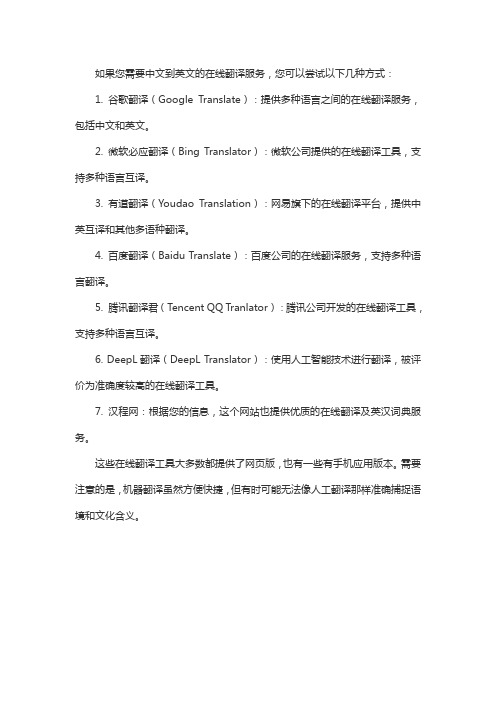
如果您需要中文到英文的在线翻译服务,您可以尝试以下几种方式:
1. 谷歌翻译(Google Translate):提供多种语言之间的在线翻译服务,包括中文和英文。
2. 微软必应翻译(Bing Translator):微软公司提供的在线翻译工具,支持多种语言互译。
3. 有道翻译(Youdao Translation):网易旗下的在线翻译平台,提供中英互译和其他多语种翻译。
4. 百度翻译(Baidu Translate):百度公司的在线翻译服务,支持多种语言翻译。
5. 腾讯翻译君(Tencent QQ Tranlator):腾讯公司开发的在线翻译工具,支持多种语言互译。
6. DeepL翻译(DeepL Translator):使用人工智能技术进行翻译,被评价为准确度较高的在线翻译工具。
7. 汉程网:根据您的信息,这个网站也提供优质的在线翻译及英汉词典服务。
这些在线翻译工具大多数都提供了网页版,也有一些有手机应用版本。
需要注意的是,机器翻译虽然方便快捷,但有时可能无法像人工翻译那样准确捕捉语境和文化含义。
翻译的名词解释

翻译的名词解释翻译(Translation)是指将一种语言中的文字、口语或者书面表达转化为另一种语言中相应的文字、口语或者书面表达的过程。
翻译是一种跨语言和跨文化的沟通方式,能够帮助不同语言和文化背景的人们相互理解和交流。
翻译作为一门学科,拥有自己的理论和方法体系。
翻译的目标是准确传达原文的内容和意思,同时在目标语言中保持语言风格和文化背景的一致性。
翻译是一项复杂而艰巨的任务,需要对两种语言的语法、词汇、语境和文化等方面都有深入的理解。
翻译者不仅需要具备良好的语言能力,还需要具备一定的专业知识和背景,以确保翻译结果的准确性和可理解性。
在翻译过程中,翻译者通常会遇到一系列的挑战。
首先,语言之间的差异常常会导致一些单词和句子的难以准确对应和转化。
此外,不同语言和文化中的习语、成语、象征等也会给翻译带来困扰。
翻译者还需要注意语言风格和表达方式的转换,以确保翻译结果能够与目标语言的受众产生共鸣。
翻译有多种形式,可以分为口译和笔译两大类。
口译是在口头交流中实时传译的形式,通常用于会议、演讲、座谈会等场合。
笔译则是将书面材料进行翻译,如文学作品、商务文件、科技论文等。
随着科技的发展,机器翻译(Machine Translation)也成为了翻译领域的重要分支。
机器翻译通过计算机程序自动将一种语言转化为另一种语言,大大提高了翻译的效率和速度。
翻译的应用领域广泛。
政府机构、国际组织、跨国公司等需要翻译来进行国际间的交流和合作。
文学作品、电影、电视剧等艺术作品的翻译能够让不同语言的读者和观众享受到文化的交流和共享。
学术研究、科技创新等领域也需要翻译来推动知识和信息的传播。
此外,旅游业、国际交流等也离不开翻译的帮助。
总之,翻译作为一项重要的语言交流工具,发挥着重要的作用。
通过翻译,不同语言和文化的人们能够相互理解、相互尊重,并且更好地实现跨语言和跨文化的交流与合作。
英语短语及翻译

英语短语及翻译英语短语及翻译精选1. hello.你好!2. good morning.早晨好!3. i'm john smith.我是约翰、史密斯。
4. are you bill jones?你是比尔、琼斯吗?5. yes,i am.是的,我是。
6. how are you?你好吗?7. fine,thanks.很好,谢谢。
8. how is helen?海伦好吗?9. she's very well,thank you. 她很好,谢谢您。
10. good afternoon,mr. green.午安,格林先生。
11. good evening,mrs. brown.晚上好,布朗夫人。
12. how are you this evening?今晚上您好吗?13. good night,john.晚安,约翰。
14. good-bye,bill.再见,比尔。
15. see you tomorrow.明天见。
16. come in,please. 请进!17. sit down. 坐下!18. stand up,please. 请站起来。
19. open your book,please. 请把书打开。
20. close your book,please. 请把书合上。
21. don't open your book. 别打开书。
22. do you understand?你明白了吗?23. yes,i understand. 是的,我明白了。
24. no,i don't understand. 不,我不明白。
25. listen and repeat. 先听,然后再重复一遍。
26. now read,please. 现在请大家读。
27. that's fine. 好得很。
28. it's time to begin. 到开始的时候了。
29. let's begin now. 现在让我们开始。
翻译用英语怎么说?
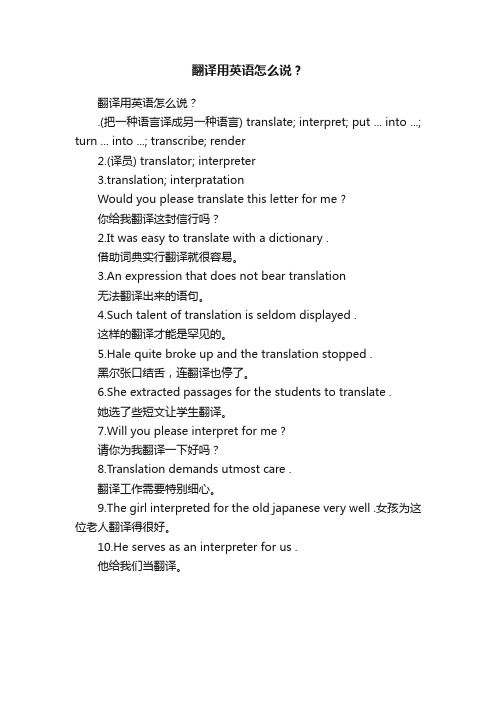
翻译用英语怎么说?翻译用英语怎么说?.(把一种语言译成另一种语言) translate; interpret; put ... into ...; turn ... into ...; transcribe; render2.(译员) translator; interpreter3.translation; interpratationWould you please translate this letter for me ?你给我翻译这封信行吗?2.It was easy to translate with a dictionary .借助词典实行翻译就很容易。
3.An expression that does not bear translation无法翻译出来的语句。
4.Such talent of translation is seldom displayed .这样的翻译才能是罕见的。
5.Hale quite broke up and the translation stopped .黑尔张口结舌,连翻译也停了。
6.She extracted passages for the students to translate .她选了些短文让学生翻译。
7.Will you please interpret for me ?请你为我翻译一下好吗?8.Translation demands utmost care .翻译工作需要特别细心。
9.The girl interpreted for the old japanese very well .女孩为这位老人翻译得很好。
10.He serves as an interpreter for us .他给我们当翻译。
原文翻译

原文:夸父与日逐走,入日;渴,欲得饮,饮于河,渭;河,渭不足,北饮大泽。
未至,道渴而死。
弃其杖,化为邓林。
译:夸父与太阳竞跑,一直追赶到太阳落下的地方;他感到口渴,想要喝水,就到黄河、渭河喝水。
黄河、渭河的水不够,又去北方的大泽湖喝水。
还没赶到大泽湖,就半路渴死了。
他遗弃的手杖,化成邓林。
共工怒触不周山原文:昔者,共工与颛顼争为帝,怒而触不周之山,天柱折,地维绝。
天倾西北,故日月星辰移焉;地不满东南,故水潦尘埃归焉。
译:从前,共工与颛顼争夺部落首领,(共工在大战中惨败)(共工)愤怒地用头撞击不周山,支撑着天的柱子折断了,拴系着大地的绳索也断了。
(结果)天向西北方向倾斜,日月、星辰都向西北方向移动了;大地的东南角陷塌了,所以江河积水泥沙都朝东南角流去了。
从翻译的定义看翻译的三种类型

从翻译的定义看翻译的三种类型
从中文翻译的定义来看,中文翻译主要可以分为以下三种类型:
1. 直译(Literal Translation):直译是指将原文按照字面意思逐
词逐句翻译成目标语言,保持原文的结构和语法。
直译有时候可能会导致
目标语言的表达不准确或者不自然,但它可以保留原文的特色和文化内涵。
2. 意译(Sense-for-sense Translation):意译是指根据原文的意
义和目标语言的习惯表达方式,在保持意思准确的前提下进行转换。
意译
可以更好地传达原文的意思,使目标语言读者更容易理解。
在意译过程中,译者通常会根据原文的背景、语境和文化差异进行调整和转化。
3. 言语贴切(Free Translation):言语贴切是指在翻译过程中,
译者根据原文的意思和目标语言的表达方式,灵活运用语言,以更好地传
达原文的意思。
言语贴切注重整体意义的传达,而不是逐词逐句地翻译。
这种翻译方式更注重目标语言读者的阅读体验,常用于文学作品或口译领域。
需要注意的是,具体选择哪种翻译类型取决于原文的特点、翻译目的
和目标语言读者的需求。
多数情况下,翻译过程中会结合以上三种翻译类
型进行灵活应用。
翻译的名词解释

翻译的名词解释
翻译是指从一种语言(源语)翻译成另一种语言(目标语)的过程,通常为了把原文的意思直接和准确地表达出来。
在这种情况下,术语“翻译”有很多不同的定义,包括:简单的词汇翻译,句子翻译,语篇翻译,文化翻译,等等。
译者可以改变原文的措辞和风格,但这不会影响原文的意思表达。
词汇翻译是翻译的基本,也是最基础的一个部分。
它涉及把源语中的单词或短语翻译为目标语中的单词或短语。
一般来说,词汇翻译要求译者有较强的源语和目标语的文化知识和语言理解能力,以确保译文语义的准确性和表达的流畅性。
句子翻译是翻译最常用的一种形式,涉及把源语中的一个完整句子翻译成目标语中的完整句子。
在翻译句子时,译者要注意保持原文句子的语法结构和语义,同时认真核对语法以及句子的上下文,以确保翻译的准确性。
语篇翻译是翻译一篇文档的过程,它涉及把源语中的一个整体文献翻译成目标语中的完整文献。
在翻译语篇时,译者应当保持原文文档的语言风格,使译文流畅,而不失原文文本的语义,并且考虑到文档的上下文和内在语义,以确保翻译准确无误。
文化翻译是翻译一篇文档时遇到不同文化方面的事物,包括人名,地名,习俗和风俗,社会秩序,食品习惯,宗教信仰,等等。
在翻译过程中,译者需要搜集并参考大量的文化资料,以正确地理解并准确表达源语文本中的文化内涵。
总之,词汇翻译,句子翻译,语篇翻译,文化翻译都是翻译的主要内容,都是译者需要掌握的基本技能之一。
正确的翻译可以让把原文的意思准确地表达出来,以满足不同文化国家之间交流信息的需求。
- 1、下载文档前请自行甄别文档内容的完整性,平台不提供额外的编辑、内容补充、找答案等附加服务。
- 2、"仅部分预览"的文档,不可在线预览部分如存在完整性等问题,可反馈申请退款(可完整预览的文档不适用该条件!)。
- 3、如文档侵犯您的权益,请联系客服反馈,我们会尽快为您处理(人工客服工作时间:9:00-18:30)。
毕业论文(设计)外文译文题目悲哀的青年一代系部外语系专业语言文学专业年级 07级学生姓名邓晓云学号 070312005指导教师樊国光悲哀的青年一代罗德w霍顿,赫伯特w爱德华兹二十世纪二十年代社会生活的各个方面中,青年一代的叛逆之行是被人们抨击的最多的了。
只要稍微一提到那个时期,就会勾起中年人对过去的缅怀和青年人好奇的提问。
中年人会回忆起第一次光顾非法售酒点时的那种既高兴又不安的违法犯罪的刺激感,回忆起对清教徒的道德规范的勇猛抨击,回忆起停在乡村小路上的轿车里颠鸾倒凤的时髦爱情经历;青年人则会问起有关那时的一些肆意狂欢的爵士舞会,问起那成天饮酒作乐,勾引女子的"美男子",问起那些"时髦少女"和"游荡牛仔"的奇异服饰和奇思怪想等等的情况。
今天的青年学生们不禁会问他们的老师和父母:"那时的青年果真这样狂放不羁吗?"。
"那时真的有过青年一代的问题吗?"对这种问题的回答必然只能是既"对"又"不对"--说"对,,是因为所谓青年一代的问题会伴随人的成长;说"不对"是因为生活在在当时社会的人看起来是那么狂野,那么不负责任,那么不讲道德的,若是用今天的正确眼光去看的话,却远远不如今天的一些狂恋爵士乐的青年的堕落行为那么骇人听闻。
实际上,青年一代的叛逆行为是当时时代条件的必然结果。
首先,值得记住的是,这种叛逆行为并不局限于美国,而是作为惨烈的第一次世界大战的后遗症影响到整个西方世界。
其次,在美国,有一些人已经很不情愿地认识到--如果不是明明白白地认识到,至少是下意识地认识到--无论在政治方面还是在传统方面,我们的国家已不再是与世隔绝的了;我们所取得的国际地位使我们不再处于人造围墙之后,或是躲在相邻的两大洋的地理拥护之中了。
在当时的美国,抛弃维多利亚式的教养无论如何都已经是势在必行的了。
美国工业的飞速繁荣及其所带来的庞大的、机器轰鸣的工厂的出现,社会化大生产的非人格性,以及侵略意识的空前膨胀,让在较为平静而少竞争的年代里所形成的礼貌行为和良好的道德教养完全没有半点栖身之地。
不论是否发生战争,随着时代的变化.接受必须在这个喧嚣的商业化社会中拼搏求胜的格格不入的行为准则,这对于我们年青一代来说已经变得越来越难了。
在加速维多利亚式社会结构的崩溃中,战争只不过起了一种催化剂的作用。
战争把年轻一代一下子推向一战的大规模的屠杀战争中,从而使他们体内潜藏的狂暴力量得以释放出来,战争一结束,在欧洲和美国这些狂暴力量便掉转矛头,去摧毁那日渐腐朽的十九世纪的社会了。
因此,在一个时刻变化着的世界中,青年一代便面临着使我们的道德习惯与时俱进这一挑战。
而与此同时,青年人—至少美国的青年人——又试图逃避自己的责任,沉溺于一种饮酒作乐的生活作风之中,装出一副波希米亚式的浪荡的样子。
追求时尚,为了追求短暂的快乐和一时的新奇而大肆挥霍,纵情狂欢,寻求各种各样的感官刺激——性行为,吸毒,酗酒以及各种各样的堕落行为——这些都是他们逃避责任的表现,这可能是由于社会的普遍繁荣及战后人们厌烦了政治、经济限制和国际义务所造成的。
禁酒法令使青年人有了更多的机会寻求违禁寻乐的刺激。
文人骚客纷纷涌人格林威治村,他们那些被大肆渲染的放纵行为和挑战性言论也为青年人的逃避提供了一种生活模式和一套哲学辩护辞。
如同大多数逃避主义者的纵情狂欢一样,这种逃避主义者的纵情狂欢,一直要持续到狂欢者口袋空空为止。
直到二十年代末世界经济结构崩溃之时,这种狂欢宴会才告停歇,并迫使那些寻欢作乐者从酣醉中醒来,去面对新时代的一系列问题。
从第一次世界大战起,青年人的叛逆行为便开始了。
1915-1916年间那持久的僵持局面,德国对美国的越来越傲慢无礼的冒犯,以及美国政府迟迟不愿宣布参战的作法,都使我们具有理想主义的公民忍无可忍。
我们的青年,本身就具有典型的美国式的冒险精神,又多少受到西奥多·罗斯福的狂热沙文主义思想的影响,于是便开始在外国旗帜下入伍参战。
用约翰·多斯·帕索斯的《美利坚合众国》中的人物乔·威廉斯的话说,他们"是想趁着战争还没结束就参加到战争中去"。
因为在1916-1917年间,入伍当兵还是一种富于浪漫色彩的职业。
在1917年正处于上大学年龄的年轻人对于现代战争还一无所知。
1861-1865年间的那场战争早已通俗地在电影和小说中成了一部散发出玉兰花香的肥皂剧。
而1898年同西班牙之间的百日之战战在影剧故事中总是被描写成美军在马尼拉单方面全胜或是冲上圣胡安山顶。
除此之外,更有许多演说家们在中学生集会上大肆宣扬战场上的紧张生活有利于锻炼人的性格,使得那些本来还算有些头脑的年轻人都信以为真,以为到欧洲战场上去服役不仅是一件令人兴奋的理想化的美事,还具有巨大的人生价值。
于是,越来越多的年轻人纷纷开始加入外国的各兵种,"知识分子型的人"加入救护兵团.其余的人则分别加入步兵部队、商船队,或到其他任何有其用武之地的部门服役。
那些不愿到外国军队里去服役的人则表示自己随时"待命出发";偶尔也有人考虑参加国民自卫队的,等到我国最终决定参战时.他们便踊跃地报名参军。
各征兵站的报名者都门庭若市,搞得主管征兵事务的军人们一个头两个大,无力应对,以至于恳求志愿报名者"先回家,待征召".然而,有自尊心的人不愿蒙受"被征召入伍"的耻辱纷纷主动参军,因此,青年人的入伍热潮长久不衰。
一旦这些满腔热血的年轻人饱尝了二十世纪战争的滋味后,那种肆情狂欢的激情和要从事军事冒险的热情自然很快就烟消云散了。
他们可以永远感到光荣,因为一下赫赫战功,但是1919年从战场上回来的却是一批已经发生了很大变化的士兵。
特别是大学兵团的士兵们,他们在理想主义的感召下很早就到军中服役,见证了许多伟大的时刻。
对他们来说,回到几乎没有受到战争的任何影响的故乡是一件痛苦的事,因为在那里,人们仍在像庆祝独立日时那样天真地高谈阔论爱国主义,而这是他们自己两三年前也曾犯过的错误。
更令他们痛苦的是,他们发现自己原来的工作已被未参战军的人取代了。
而当时又恰逢经济萧条时期,新的工作无法找到,而且人们把老兵看作问题孩子,他们宁愿聘用未参战的人,也不愿聘用老兵。
他们自己的家对他们来说也常常是不舒服的;他们再也不能适应家乡和家庭了,并且产生出一种突如其来的迷惘的厌世之感。
不论是他们自己还是他们的亲友们都不能理解这种感觉。
战争激起了他们的热情,却摧毁了他们的纯真。
而现在,落后的地方遍布全国的,到处都让他们抑制他们的热情,并恢复那种自欺欺人的、维多利亚式的天真无邪的态度。
但是他们现在觉得这种态度同那种说什么他们的战斗已"使民主在这个世界有了保障"的论调一样,都是腐旧过时的。
再者,好像家乡的情况还不够他们受似的,退伍军人还得面对凡尔赛和约那种愚蠢的、拿破仑式的犬儒主义,禁酒法令那种虚伪的行善主义,以及那些发了战争财的所谓的爱国主义者。
那些愤世嫉俗的美国青年们的不满最终会爆发出来的。
经过短期的强烈的怨恨之后,它终于以一种完全推翻温文尔雅的行为准则的形式爆发出来了。
格林威治村为他们建立了模式。
自十九世纪七十年代因其生活花销低廉而成为艺术家和作家聚居地以来,格林威治村在很长时间里一直享有波希米亚式生活和怪僻行为的搞不清到底是好还是坏的名声。
曾经,尤其是在一战之前的十年中,这地方还曾居住过许多大名鼎鼎的作家,因此它成了名副其实的全美国文人墨客中心。
战后,那些从脑子里和透过笔杆子都反对对战争、市侩气和"清教徒式"的道德修养的有希望有作为的的作家们便自然而然地聚集到这个传统的艺术中心——格林威治村,这儿的生活花销在1919年还是很低廉。
在这儿,这些艺术家可以去倾注他们那刚获得的创造力,去摧毁旧世界,去嘲弄前辈们所信守的道德规范,以及把自己的一切都献给艺术、爱情和感官享受。
The Sad Young MenRod W. Horton and Herbert W. EdwardsNo aspect of life in the Twenties has been more commented upon and sensationally romanticized than the so-called Revolt of the Younger Generation. The slightest mention of the decade brings nostalgic recollections to the middle-aged and curious questionings by the young: memories of the deliciously illicit thrill of the first visit to a speakeasy, of the brave denunciation of Puritan morality, and of the fashionable experimentations in amour in the parked sedan on a country road; questions about the naughty, jazzy parties, the flask-toting "sheik," and the moral and stylistic vagaries of the "flapper" and the "drug-store cowboy." "Were young people really so wild?" present-day students ask their parents and teachers. "Was there really a Younger Generation problem?" The answers to such inquiries must of necessity be "yes" and "no"--"Yes" because the business of growing up is always accompanied by a Younger Generation Problem; "no" because what seemed so wild, irresponsible, and immoral in social behavior at the time can now be seen in perspective as being something considerably less sensational than the degeneration of our jazz mad youth.Actually, the revolt of the young people was a logical outcome of conditions in the age: First of all, it must be remembered that the rebellion was not confined to the United States, but affected the entire Western world as a result of the aftermath of the first serious war in a century. Second, in the United States it was reluctantly realized by some- subconsciously if not openly -- that our country was no longer isolated in either politics or tradition and that we had reached an international stature that would forever prevent us from retreating behind the artificial walls of a provincial morality or the geographical protection of our two bordering oceans.The rejection of Victorian gentility was, in any case, inevitable. The booming of American industry, with its gigantic, roaring factories, its corporate impersonality, and its large scale aggressiveness, no longer left any room for the code of polite behavior and well-bred morality fashioned in a quieter and less competitive age. War or no war, as the generations passed, it became increasingly difficult for our young people to accept standards of behavior that bore no relationship to the bustling business medium in which they were expected to battle for success. The war acted merely as a catalytic agent in this breakdown of the Victorian social structure, and by precipitating our young people into a pattern of mass murder it released their inhibited violent energies which, after the shooting was over, were turned in both Europe and America to the destruction of an obsolescent nineteenth-century society.Thus in a changing world youth was faced with the challenge of bringing our mores up todate. But at the same time it was tempted, in America at least, to escape its responsibilities and retreat behind an air of naughty alcoholic sophistication and a pose of Bohemian immorality. The faddishness , the wild spending of money on transitory pleasures and momentary novelties , the hectic air of gaiety, the experimentation in sensation -- sex, drugs, alcohol, perversions -- were all part of the pattern of escape, an escape made possible by a general prosperity and a post-war fatigue with politics, economic restrictions, and international responsibilities. Prohibition afforded the young the additional opportunity of making their pleasures illicit , and the much-publicized orgies and defiant manifestoes of the intellectuals crowding into Greenwich Village gave them a pattern and a philosophic defense for their escapism. And like most escapist sprees, this one lasted until the money ran out, until the crash of the world economic structure at the end of the decade called the party to a halt and forced the revelers to sober up and face the problems of the new age.The rebellion started with World War I. The prolonged stalemate of 1915 -- 1916, the increasing insolence of Germany toward the United States, and our official reluctance to declare our status as a belligerent were intolerable to many of our idealistic citizens, and with typical American adventurousness enhanced somewhat by the strenuous jingoism of Theodore Roosevelt, our young men began to enlist under foreign flags. In the words of Joe Williams, in John Dos Passos' U. S. A., they "wanted to get into the fun before the whole thing turned belly up." For military service, in 1916-- 1917, was still a romantic occupation. The young men of college age in 1917 knew nothing of modern warfare. The strife of 1861 --1865 had popularly become, in motion picture and story, a magnolia-scented soap opera, while the one hundred-days' fracas with Spain in 1898 had dissolved into a one-sided victory at Manila and a cinematic charge up San Juan Hill. Furthermore, there were enough high school assembly orators proclaiming the character-forming force of the strenuous life to convince more than enough otherwise sensible boys that service in the European conflict would be of great personal value, in addition to being idealistic and exciting. Accordingly, they began to join the various armies in increasing numbers, the "intellectuals" in the ambulance corps, others in the infantry, merchant marine, or wherever else they could find a place. Those who were reluctant to serve in a foreign army talked excitedly about Preparedness, occasionally considered joining the National Guard, and rushed to enlist when we finally did enter the conflict. So tremendous was the storming of recruitment centers that harassed sergeants actually pleaded with volunteers to "go home and wait for the draft," but since no self-respecting person wanted to suffer the disgrace of being drafted, the enlistment craze continued unabated.Naturally, the spirit of carnival and the enthusiasm for high military adventure were soon dissipated once the eager young men had received a good taste of twentieth- century warfare. Totheir lasting glory, they fought with distinction, but it was a much altered group of soldiers who returned from the battlefields in 1919. Especially was this true of the college contingent, whose idealism had led them to enlist early and who had generally seen a considerable amount of action. To them, it was bitter to return to a home town virtually untouched by the conflict, where citizens still talked with the naive Fourth-of-duly bombast they themselves had been guilty of two or three years earlier. It was even more bitter to find that their old jobs had been taken by the stay-at-homes, that business was suffering a recession that prevented the opening up of new jobs, and that veterans were considered problem children and less desirable than non-veterans for whatever business opportunities that did exist. Their very homes were often uncomfortable to them; they had outgrown town and families and had developed a sudden bewildering world-weariness which neither they nor their relatives could understand. Their energies had been whipped up and their naivete destroyed by the war and now, in sleepy Gopher Prairies all over the country, they were being asked to curb those energies and resume the pose of self-deceiving Victorian innocence that they now felt to be as outmoded as the notion that their fighting had "made the world safe for democracy." And, as if home town conditions were not enough, the returning veteran also had to face the sodden, Napoleonic cynicism of Versailles, the hypocritical do-goodism of Prohibition, and the smug patriotism of the war profiteers. Something in the tension-ridden youth of America had to "give" and, after a short period of bitter resentment, it "gave" in the form of a complete overthrow of genteel standards of behavior.Greenwich Village set the pattern. Since the Seven-ties a dwelling place for artists and writers who settled there because living was cheap, the village had long enjoyed a dubious reputation for Bohemianism and eccentricity. It had also harbored enough major writers, especially in the decade before World War I, to support its claim to being the intellectual center of the nation. After the war, it was only natural that hopeful young writers, their minds and pens inflamed against war, Babbittry, and "Puritanical" gentility , ,should flock to the traditional artistic center (where living was still cheap in 1919) to pour out their new-found creative strength, to tear down the old world, to flout the morality of their grandfathers, and to give all to art, love, and sensation.。
